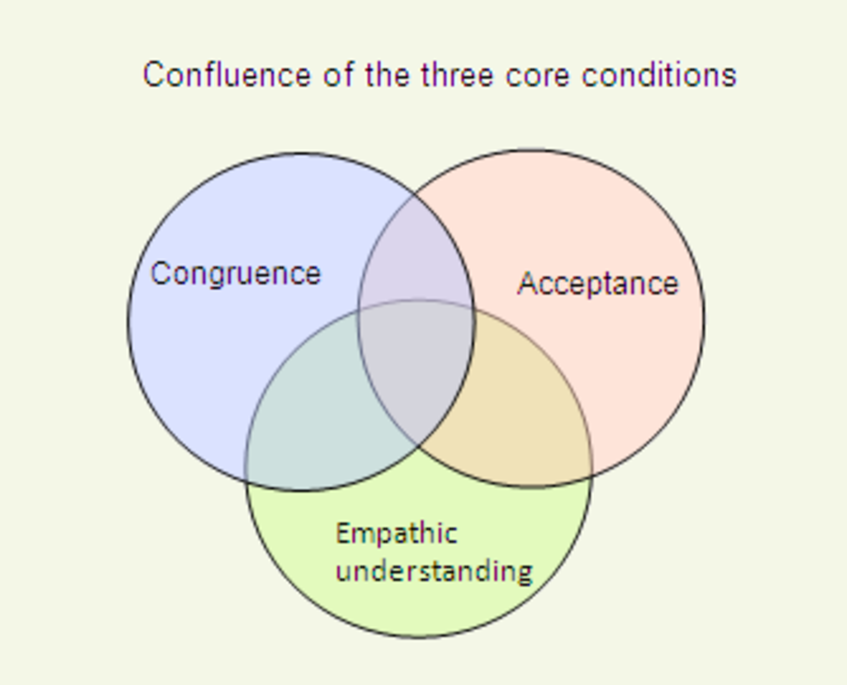Rogers variables
Person-centered attitudes

Figure: Confluence of the three Variables
Rogers and his colleagues found from thousands of interviews and solid research studies that the actualizing tendency can unfold itself best, or in other words, students learn most significantly, in an atmosphere or climate in which the facilitator (manager, instructor, teacher, etc.) holds three core attitudes such that the other persons perceive them, at least to some degree (Rogers, 1961). These attitudes are: Congruence, with synonyms such as, realnessi, transparency, genuineness, authenticity; it also includes a lived, moment to moment openness to experience; Acceptance, else referred to as respect, unconditional positive regard, caring attitude, concern for the individual; it implies a non-judgmental attitude; Empathic understanding, a deep form of understanding of the meanings as well as feelings of the other person from his or her point of view. In more detail, Rogers (1983, p. 115) wrote: “There are three conditions that must be present in order for a climate to be growth-promoting. These conditions apply whether we are speaking of the relationship between therapist and client, parent and child, leader and group, teacher and student, administrator and staff. The conditions apply in fact in any situation in which the development of the person is the goal.” (Rogers, 1983, S. 115)
Congruence
”Perhaps the most basic of these essential attitudes is realness, or genuineness. When the facilitator is a real person, being what he or she is, entering into relationships with the learners without presenting a front or a fassade, the facilitator is much more likely to be effective. This means, that the feelings the facilitator is experiencing are available to his or her awareness, that he or she is able to live these feelings, to be them, and able to communicate them if appropriate.” (Rogers, 1983, S. 121) ”When the facilitator is a real person, … the feelings the facilitator is experiencing are available to his or her awareness, … he or she is able to live these feelings, to be them, and able to communicate them if appropriate.” (Rogers, 1980, S. 271) ”As for the therapist, what he or she is experiencing is available to awareness, can be lived in the relationship, and can be communicated, if appropriate.“ (Rogers, 1980, S. 115) More on congruence
Acceptance, positive regard
"I find that the more acceptance and liking I feel toward this individual, the more I will be creating a relationship which he can use. By acceptance I mean a warm regard for him as a person of unconditional self-worth, of value no matter what his condition, his behavior, his feelings. It means a respect and liking for him as a separate person, a willingness for him to possess his own feelings in his own way." (Rogers, 1961, S. 34)
Understanding, empathy
"[…] I feel a continuing desire to understand - a sensitive empathy which each of the client's feelings and communications as they seem to him at that moment. Acceptance does not mean much until it involves understanding. It is only that I understand the feelings and thoughts which seem so horrible to you, or so weak […] - it is only as I see them as you see them and accept them and you, that you feel really free to explore […] your inner and often buried experience. […] There is implied here a freedom to explore oneself at both conscious and unconscious levels." (Rogers, 1961, S. 35) “To understand another person’s thoughts and feelings thoroughly, with the meanings they have for him, and to be thoroughly understood by this person in return—this is one of the most rewarding of human experiences, and all too rare.“ (Rogers, 1961, S. 323) Rogers has observed a puzzling paradox around the attitude of acceptance in combination with openness. He writes: “The more I am open to the realities in me and in the other person, the less do I find myself wishing to rush in to ‘fix things’. As I try to listen to myself and the experiencing going on in me, and the more I try to extend the same listening attitude to another person, the more respect I feel for the complex processes of life. [...] Yet the paradoxical aspect of my experience is that the more I am simply willing to be myself, in all this complexity of life, and the more I am willing to understand and accept the realities in myself and in the other person, the more change seems to bestirred up. It is a very paradoxical thing – that to the degree that each one of us is willing to be himself, then he finds not only himself changing, but he finds that other people to whom he relates are also changing” (Rogers, 1961, p. 21).
